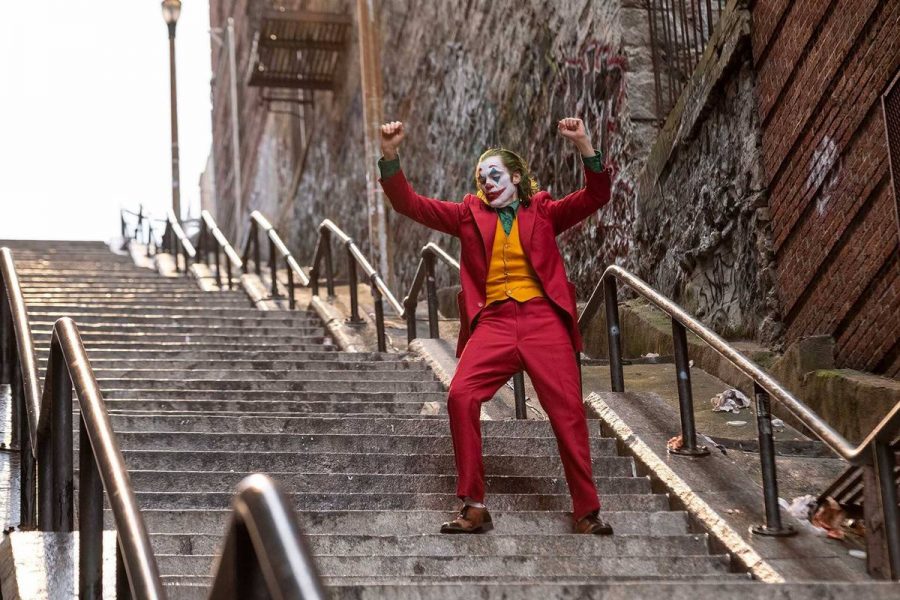Response to Joker review
Photo Courtesy of Warner Bros.
“Joker” was release on Friday, Oct. 4
This piece was written in response to the article in the Calvin Chimes titled “‘Joker’ fails at social commentary” published on October 11, 2019. It is not meant to undermine the writing abilities of the reviewer; rather, it is meant to address some issues of insensitivity and condescension we found in the review towards political affairs, economic inequality and mental illness.
The story of the Joker is the story of an individual who lives with a mental illness in an environment that casts him out for it. The film focuses on a character who experiences early childhood trauma, extreme stress, isolation and the effects that these real-life struggles have on his personality and lifestyle as an individual, which lead up to his criminal behavior. The film tells two parallel storylines: the Joker’s descent into madness and the socioeconomic upheaval at the time, and the interaction of these storylines creates a deeply interesting reflection of humankind.
The Joker’s greatest antagonists include his own relatives, people he works with, and individuals he encounters on the street. He even declares that he has no political or social motives; he is just a broken human being in need of support, which isn’t forthcoming. This culminates with his murder of Wayne’s “rich” workers. While this was (the result of?) a personal struggle for the Joker, the city quickly politicizes his actions. The appropriation of the Joker’s personal life is furthered when he appears on the Murray show and says, “You think men like Thomas Wayne ever think what it’s like to be someone like me? To be somebody but themselves? They don’t. They think that we’ll just sit down and take it like good little boys!” For the Joker, Wayne is a deeply personal reminder of his mother’s mental instability and its effect on his childhood. For the public, Wayne is a symbol of the upper class.
The reviewer writes, “‘Joker’ thinks it has a lot to say about mental illness, politics, culture and economics, but none of it really hits. It’s all shouted incoherently at you with not enough focus on any one thing.” But this is not the case. During one scene, Wayne says, “Well, what I will say is, there’s something wrong with those people. I’m here to help them. I want to lift them out of poverty, help make their lives better. That is why I’m running. They may not realize it, but I’m their only hope.” This quote is enough to provide the viewer with a coherent shout of the existing economic inequity and patronizing attitude of a system that fails to address the existing wealth and power gaps in Gotham. To us, this quote really “hit.” The point that the movie makes about mental illness, on the other hand, is a critique against society’s negative response to it; and this is evident in the way the Joker is treated throughout the film.
The reviewer also writes, “People complain about economics, but they’re wearing clown masks as they shout about it. Are we really supposed to take the side of a group of people who have rallied behind a psychotic clown?” The movie never poses that as a question. For the public, the Joker is not a psychotic and mentally ill figure; rather, he is what the media shows him as–a revolutionary and political figure “with anti-rich sentiment.” When it’s the Joker against Batman, we are expected to take Batman’s side, or the side of good—of justice. The goal in the film is not, “Take the side of the evil clowns!” it’s a bit more like, “Hey, look at how much human beings can mess each other up by depriving someone that is different from them of their humanity! Look at what inequity, abuse, and social isolation could do to a person! We should speak out against marginalization!” The Joker, as the villain he is, should not be anyone’s role model. What he had to say about society, however, was not entirely wrong.
The beauty of this movie lies not in its ability to make a judgement on an individual or a political movement; rather, it lies on its judgement of the environment that leads to the Joker becoming a criminal, which causes the problems in both storylines. We feel sympathy for the Joker, and yet we despise him. We abhor the violence of the protests, but we feel solidarity with their motives. The Joker became more than his own story, and the limited public access through the media to his story became fuel for something far larger than the Joker himself. The political movement used him, without him willing it, resulting in him embracing the social approval he deeply longed for in the end. And we can see how this motif reflects the end of the Dark Knight, too. In that movie, Batman allows himself to become the villain to the public, while Harvey Dent becomes a martyr for Gotham even though, in reality, he became a villain. This dissociation between Harvey Dent as Two-Face, and Harvey Dent, the hero, is allowed by Batman as the best way to help Gotham improve.
Not only does this film provide a biting criticism of the failure of a socioeconomic system and the way we treat the mentally ill, an interesting description of political symbolism, and aligns itself with familiar motifs from the Batman films, but it is also incredibly well-executed. Joaquin Phoenix’s performance was a worthy successor to Heath Ledger’s legendary portrayal of the Joker and the film had you on edge from beginning to end, just as it should. The “Joker” was emotionally draining, complex, and “hard-hitting” in ways that are atypical of comic book films. It wasn’t just intended as political commentary but it was an incredible cinematic exegesis of the complexity of humankind.



